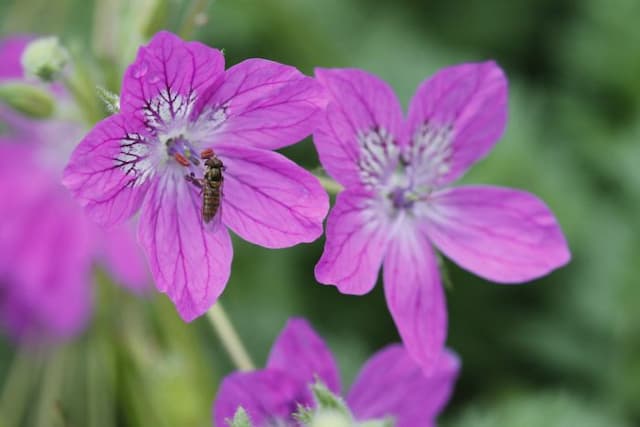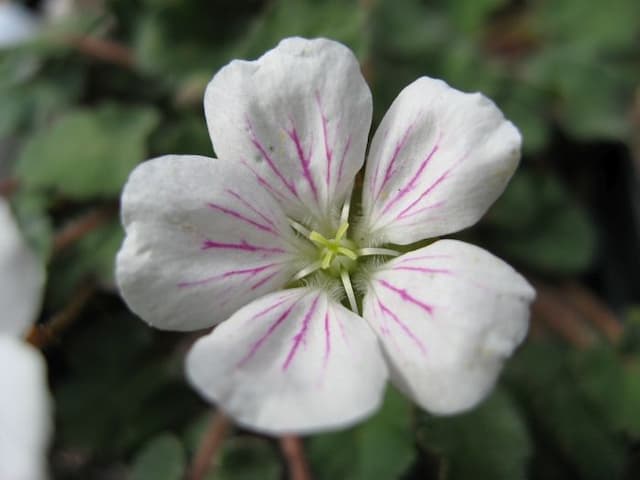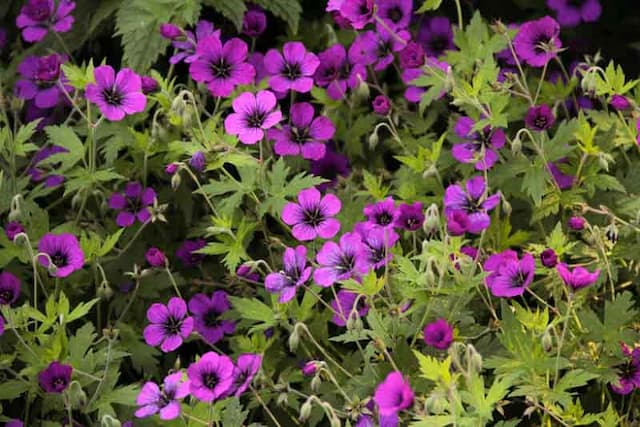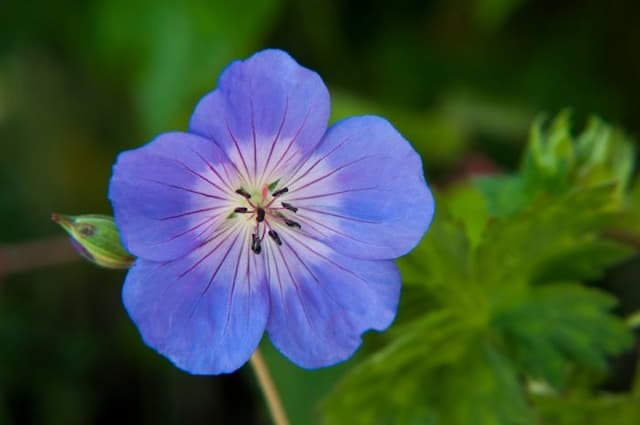Zonal Geranium Pelargonium 'Ben Franklin' (Z/d/v)

ABOUT
Pelargonium 'Ben Franklin' is a stunning plant commonly known as a geranium. This variety boasts vibrant flowers that are typically a rich shade, often resembling hues like red or pink. The flowers are grouped in clusters, known as umbels, atop sturdy stalks that rise above the foliage. Each flower cluster forms a rounded, globular shape that is visually striking and can serve as an eye-catching feature in gardens or containers. The leaves of Pelargonium 'Ben Franklin' have a unique appearance as well. They are somewhat rounded, with irregular edges that can be scalloped or lobed, giving the leaves a textured and lush appearance. These leaves are often a deep green color and may have a zonal pattern, which is a common characteristic among geraniums, where there's a contrast in coloration between the leaf center and its edges. The plant has a bushy habit, forming a dense clump of foliage and flowers. Notably, the foliage may also release a pleasant scent when touched or brushed, adding to the sensory appeal of the plant. The geranium's overall appearance is of a plant that can provide rich color and fullness, perfect for ornamental purposes in gardens or as part of a mixed display in pots or hanging baskets.
About this plant
 Names
NamesFamily
Geraniaceae.
Synonyms
Ben Franklin Geranium, Franklin Scented Geranium.
Common names
Pelargonium 'Ben Franklin'
 Toxicity
ToxicityTo humans
Geraniums, such as the Pelargonium 'Ben Franklin', are generally considered non-toxic to humans. However, consuming large amounts of the plant might cause mild upset stomach, nausea, vomiting, or diarrhea in some individuals. These plants contain geraniol and linalool, which can be irritating when ingested, but serious poisoning is unlikely.
To pets
Geraniums, which include the Pelargonium 'Ben Franklin', are known to be toxic to pets, especially cats and dogs. If a pet ingests a geranium, it may exhibit symptoms like vomiting, diarrhea, depression, anorexia, and dermatitis. In cats, geranium ingestion can also lead to ataxia, which is a loss of control of bodily movements. While the toxicity is generally considered mild to moderate, pet owners should keep these plants out of reach and consult a veterinarian if ingestion occurs.
 Characteristics
CharacteristicsLife cycle
Perennials
Foliage type
Evergreen
Color of leaves
Green
Flower color
Mixed
Height
1-2 feet (30-60 cm)
Spread
1-2 feet (30-60 cm)
Plant type
Herb
Hardiness zones
10
Native area
South Africa
Benefits
 General Benefits
General Benefits- Aesthetic Appeal: This Pelargonium variety, also commonly known as geranium, adds color and beauty to gardens and homes with its vibrant and colorful flowers.
- Low Maintenance: Geraniums are generally easy to care for, requiring minimal attention once established, which makes them suitable for various gardening skill levels.
- Drought Tolerance: Geraniums are fairly drought-tolerant, making them ideal for gardens in drier climates or for gardeners who prefer water-wise plants.
- Versatility: They can be grown in pots, hanging baskets, or in the ground, making them versatile for different garden designs and spaces.
- Long Blooming Season: Geraniums typically have a long flowering period, providing continuous color from spring through fall.
- Attracts Pollinators: The flowers of geraniums attract butterflies and bees, which are beneficial for pollinating gardens and nearby plants.
- Varied Uses: Geraniums are suitable for use in borders, as bedding plants, or for adding seasonal color in mixed containers.
- Easy Propagation: These plants can be easily propagated from cuttings, allowing gardeners to create new plants for expanding their displays or sharing with others.
- Compact Growth: The Geranium 'Ben Franklin' often has a compact growth habit, which makes it ideal for small gardens or spaces.
- Resistance to Pests: They are generally resistant to pests, reducing the need for chemical pesticides in the garden.
 Medical Properties
Medical Properties- This plant is not used for medical purposes.
 Air-purifying Qualities
Air-purifying QualitiesThis plant is not specifically known for air purifying qualities.
 Other Uses
Other Uses- Art and Craft Supplies: Leaves of the Geranium can be pressed and dried to create natural elements for scrapbooking or homemade paper making, providing a unique and organic touch.
- Scented Oils and Candles: Geraniums can be used to create fragrant oils and candles that offer a floral scent to living spaces, contributing to a calming and pleasant atmosphere.
- Flavoring Agent: The edible parts of the Geranium can be used to infuse sugar or salts with a floral flavor, adding a gourmet twist to culinary creations.
- Garden Borders: Geranium plants can be strategically planted in garden beds to create visually appealing borders due to their compact growth habits.
- Natural Fabric Dyes: The pigments in Geranium flowers and leaves can be used to dye fabrics naturally, achieving a range of colors from soft pinks to greens.
- Insect Deterrent: When planted in vegetable gardens, Geraniums can help repel certain insects without the need for chemical insecticides, thus protecting nearby plants in a natural way.
- Wildlife Attraction: Geraniums can be grown to attract beneficial insects like bees and butterflies, which are important for pollinating other plants in the garden.
- Creative Garnishes: The flowers of the Geranium can be used as edible garnishes for desserts and cocktails, offering a pop of color and a touch of elegance.
- Potpourri: Dried Geranium leaves and flowers can be included in homemade potpourri mixes, providing a lasting and natural scent to indoor spaces.
- Photography Prop: The vibrant flowers of the Geranium can serve as a beautiful prop or background in floral photography, enhancing the visual appeal of the image.
Interesting Facts
 Feng Shui
Feng ShuiThe Geranium is not used in Feng Shui practice.
 Zodiac Sign Compitability
Zodiac Sign CompitabilityThe Geranium is not used in astrology practice.
 Plant Symbolism
Plant Symbolism- Stability and Grounding: The robust nature of the geranium, to which the Pelargonium 'Ben Franklin' belongs, symbolizes stability and the ability to stay grounded in one's beliefs and actions.
- Protection: Geraniums are often associated with protection due to their strong scent, which is believed to repel negative energies and pests.
- Friendship: Geraniums can symbolize close bonds and enduring friendship, making them a popular gift among friends.
- Health and Healing: The geranium's medicinal properties, used in various cultures, signify the plant's connection to health and the process of healing.
- Peace: The geranium is also known to represent tranquility and peace, encouraging a calming presence in one's environment.
 Water
WaterThe geranium, commonly known as Pelargonium 'Ben Franklin', should be watered deeply when the top inch of soil feels dry to the touch. Water the plant at the base to avoid wetting the foliage, which can lead to fungal diseases. Typically, watering once a week is sufficient, but during hot, dry periods, more frequent watering may be necessary. Ensure that the plant receives about 1-2 gallons of water per week, adjusting for rainfall and temperature conditions.
 Light
LightGeraniums thrive in bright, indirect sunlight. Place the Pelargonium 'Ben Franklin' in a spot where it can receive at least six hours of sunlight daily. East or west-facing windows are often ideal locations for indoor geraniums, providing ample light without the harsh midday sun that could cause leaf scorch.
 Temperature
TemperatureGeraniums prefer temperate conditions and perform well in a temperature range between 65 and 75 degrees Fahrenheit. Ensure that the Pelargonium 'Ben Franklin' is not exposed to temperatures below 50 degrees Fahrenheit as it can be damaged by frost. The plant can tolerate up to 80 degrees Fahrenheit but will need increased watering in these warmer conditions.
 Pruning
PruningPruning is important for the geranium to promote bushy growth and prevent legginess. Prune Pelargonium 'Ben Franklin' by snipping off any dead or yellowing leaves and spent flower stalks. Do this regularly throughout the growing season, and more thoroughly prune the plant in early spring to encourage new growth. The best time for major pruning is after the last frost when the plant begins to grow actively again.
 Cleaning
CleaningAs needed
 Soil
SoilThe best soil mix for the geranium 'Ben Franklin' is well-draining potting soil with added perlite or sand to improve drainage. The ideal soil pH for geraniums is slightly acidic to neutral, ranging from 6.0 to 7.0.
 Repotting
RepottingGeraniums, such as 'Ben Franklin', should typically be repotted every 1-2 years to refresh the soil and provide room for growth. They should also be repotted if they become root-bound.
 Humidity & Misting
Humidity & MistingGeraniums like 'Ben Franklin' prefer moderate humidity levels, but they are quite adaptable and can tolerate lower humidity indoors. Avoid providing overly humid conditions as this can lead to fungal issues.
 Suitable locations
Suitable locationsIndoor
Provide bright light, well-draining soil, and regular watering for indoor geranium growth.
Outdoor
Plant in well-draining soil, full sun to partial shade, and water moderately.
Hardiness zone
10-11 USDA
 Life cycle
Life cycleGeranium 'Ben Franklin', commonly referred to as a Zonal Geranium, begins its life as a seed, germinating in warm, moist soil with plenty of sunlight. After germination, the seedling emerges with two cotyledons before developing true leaves and growing into a young plant. During the vegetative stage, it forms a bushy structure with distinctive zonal patterns in the leaves and begins to produce flower buds in the right conditions. Upon reaching maturity, the geranium blooms, displaying vibrant flowers that can be red, pink, purple, or white, which then attract pollinators and may result in seed production if properly fertilized. After flowering, the geranium may enter a period of dormancy, particularly in cooler climates, where it conserves energy until conditions improve for growth. If conditions are favorable year-round or the plant is kept indoors, it may continue to grow and bloom in cycles, living for several years as a perennial.
 Propogation
PropogationPropogation time
Spring-Summer
Propogation: The most popular method of propagating the Pelargonium 'Ben Franklin', commonly known as scented geranium, is by stem cuttings. This is best done in the spring or early summer when the plant is actively growing. To propagate, take a stem cutting of about 4 to 6 inches (approximately 10 to 15 cm) using a sharp, clean pair of shears. Remove any flower buds and the lower leaves to create a bare stem area, which will be inserted into the soil. Dip the cut end in rooting hormone to increase the chance of success and plant the cutting in a pot filled with a well-draining potting mix. Keep the soil moist but not soggy, and place the pot in a warm area with bright, indirect light. Roots should develop within a few weeks, after which the new geranium plant can be gradually acclimated to normal growing conditions.









![Cranesbill [Rothbury Gem]](/_next/image?url=https%3A%2F%2Fplants-admin.emdemapps.com%2Fimages%2Fplants%2F%2Fimages%2F604b6243984c2.png&w=640&q=75)